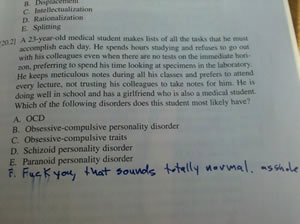
Yesterday’s posting, That’s Not OCD, You’re Just a Slacker, garnered quite a few comments. You should check them out if you haven’t already read them.
The most informative and extensive response comes from a commenter named “Another psychologist”, who sums up the problem with the multiple-choice question in the textbook quite well. It covers a number of issues with the question, including:
- The DSM. Look hard enough, and you’ll find something that you’ve got.
- Introverts vs. extroverts. North American society favours and rewards extroverts (and yes, a good chunk of my career as a tech evangelist is based on cashing in on this trait, a relative rarity in high tech).
- “Normal” vs. “abnormal” behaviour. A tricky thing, and I remember a lecture on cognition where a psych prof told our class that being slightly manic is probably a good trait for living in 21st-century North America.
- The importance of “It depends,” the most important phrase in consulting. Without knowing a little bit more about the back story of the medical student in the question, it’s hard to make a good diagnosis. Sometimes there’s little to distinguish someone having a bad day and someone who’s bipolar (it’s also hard to distinguish between “bipolar” and “asshole” at first glance).
Here’s the comment:
I’d be wary of labelling this chap as possessing “obsessive-compulsive traits” without more information than the vignette provides. His lack of delight in partying may simply be because he is relatively introverted, rather than extroverted. Another normal trait.
The problem with the Diagnostic and Statistical Manual of mental disorders (The DSM) is that there is no entry for “Normal Personality”.
If the mythical medical student did happen to have OC traits then he was using them constructively. Perhaps this was the point the examiner wished the students to understand, but there is insufficient context to know whether this is true.
As a health professional I would certainly not want to “treat” this apparently well-functioning individual unless his “traits” caused some problem that was not included in the brief description.
One of the things I tried to teach my interns was a healthy skepticism about what was “abnormal” behavior, given the environment and the circumstances of the situation in which it was expressed, and a health skepticism about interpreting elevations on standard personality scales without knowing the patient’s history and background.
If a patient throws a tantrum in a waiting room when told that this Xray has been cancelled again (for the fourth time) this does not necessary mean that the patient is suffering from a personality disorder or impairment of the parts of the brain that regulate behavioural expression. A sick person who is struggling with pain and indignity is entitled to this type of behaviour in the circumstances.
When a group of intern psychologists, but not the intern medicos, get blips on the personality disorder scale of a well-known test it does not mean that the psych group are all deviants who should not be practising psycyology. It probably means that they are good researchers who have been trained to question authority.
I hope the professor who set the test made this kind of thing clear.
Thanks for the comment, Another psychologist! And to all of you, please feel free to keep the discussion going.
This article also appears in The Adventures of Accordion Guy in the 21st Century.